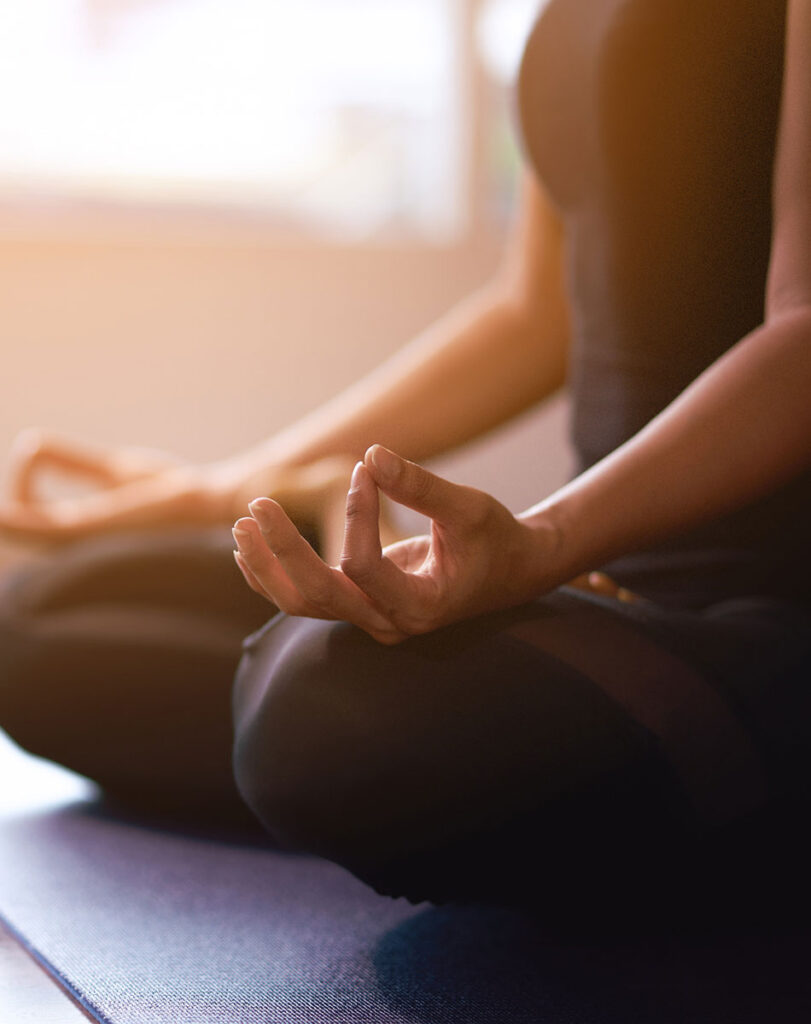At Lotus Recovery, we believe in the power of holistic approaches to support recovery and enhance well-being. Meditation is a powerful tool that can play a significant role in helping individuals recover from mental health issues and substance use disorders. One of the reasons why our team values this practice as much as we do is because it’s simple, fast and effective. You can practice meditation whenever you are feeling stressed, anxious or worried, allowing you to tackle your feelings head-on and restore your calm and inner peace.
Our team will teach you the basics of meditation, its benefits and the parts involved. While each person is different, most are able to pick up the basics of meditation in about 10 days. Keep in mind that meditation can be as formal or informal as you want. This is a tool meant to support your recovery, not cause more stress. Being open to this practice can expand your coping tools and greatly improve your chances for long-term recovery!

Understanding Meditation
Meditation is a holistic practice that involves focusing the mind and eliminating distractions to achieve a state of mental clarity and emotional calm. It has been practiced for thousands of years across various cultures and spiritual traditions, though these days, it’s mostly used to relax and lower stress.
There are many types of meditation, including mindfulness meditation, guided meditation and mantra meditation. Even practices like qigong, tai chi and yoga incorporate meditation into them. Each type of meditation offers unique benefits. While there is no right or wrong type of meditation to practice, it’s important to find one that meets your needs and supports your goals for recovery.
Here at Lotus Recovery, we most commonly practice mindfulness meditation. This type of meditation originates from Buddhist teachings and is most popular in the West. With mindfulness meditation, you focus your attention on one thing, such as your breathing. You then notice your thoughts and feelings without judgment and allow them to pass. Mindfulness meditation is an excellent tool that can help you become more mindful and aware of the present, and you can practice it alone without a teacher.
Meditation for Mental Health Treatment
Meditation can be a valuable tool in managing and improving mental health. While it can be particularly beneficial for those with mental health disorders, anyone can benefit from it.
Reduces Stress and Anxiety
Meditation helps calm the mind, reducing the production of stress hormones like cortisol. Too much cortisol can disrupt the body’s processes, leading to mental health problems like anxiety and depression. By practicing meditation, you can better manage your anxiety and enjoy a more relaxed state of being.
Enhances Emotional Well-Being
Meditation encourages a positive outlook on life, fostering a sense of inner peace and emotional stability. It can help manage the symptoms of depression and improve overall mood. As you recover from mental health problems, this can be particularly valuable, as individuals who think positively tend to have better outcomes.
Promotes Mindfulness
Mindfulness meditation teaches you how to live in the present moment, reducing overthinking and helping you appreciate the here and now. This supports the “one day at a time” mentality. Taking things day by day shifts your thinking to the present and prevents your mind from wandering to the past or present, two things you can’t control. Living in the present also leads to greater self-awareness and emotional regulation.
Meditation for Addiction Treatment
Meditation also supports recovery from substance use, allowing you to treat dual diagnosis with one simple practice. The benefits to expect are:
Reduces Cravings
Meditation helps reduce cravings by promoting self-control and awareness. It allows individuals to observe their cravings without acting on them, which is crucial for long-term recovery. Eventually, you’ll learn how to use this practice whenever you feel triggered to use substances.
Enhances Coping Skills
Through meditation, individuals learn healthy coping mechanisms to deal with triggers and stressors that may lead to relapse. You can’t escape stress completely, as it’s a normal part of life. But, by having good coping skills, you will be able to tolerate, minimize and deal with stressful situations so that you don’t turn to drugs or alcohol.
Improves Sleep
Many people in substance use recovery struggle with sleep disturbances. Meditation is a medication-free tool that promotes better sleep by calming the mind and relaxing the body. It also slows down breathing and lowers heart rate, while allowing you to release your thoughts and worries from the day. It’s a great way to start and end your daily routine!
Getting Started With Meditation
There are many ways you can learn how to meditate, but the team at Lotus Recovery will get you started. This way, you can get comfortable using this practice to cope with stress, regulate your emotions and improve your sleep. The good news is that starting a meditation practice doesn’t have to be complicated. It involves finding a quiet space, focusing on your breathing and observing your thoughts.
We recommend starting with short sessions, usually 5-10 minutes, and you can gradually increase the time limit from here. Consistency is also important, so we tell our clients to try and meditate at the same time every day to build a routine. Even individuals who are skeptical of meditation at first often find this to be their favorite practice for relaxing the mind and body!
Meditation for Dual Diagnosis Treatment in Thousand Oaks
If you are struggling with mental health issues or substance use disorders, meditation can be a transformative tool in your recovery journey. Not only is it simple and effective, but you can also address both addiction and mental health at the same time. Contact Lotus Recovery to learn more about our meditation programs and how we can support your path to health and wellness.
